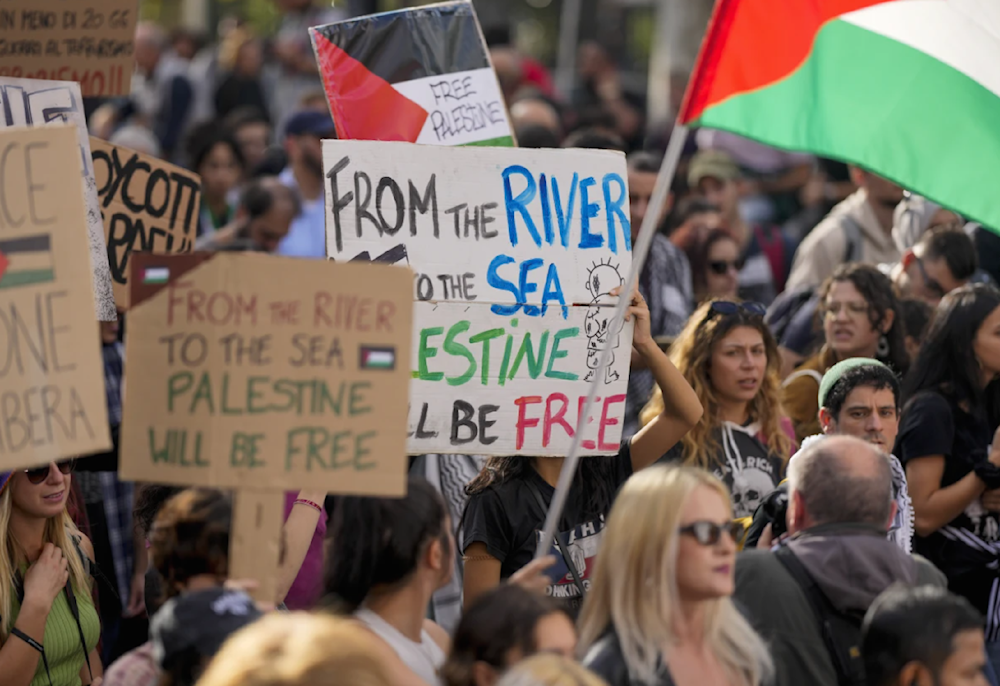'From the river to the sea' not necessarily hate speech: Meta board
According to the oversight board, the lack of a single meaning means a blanket ban, which “would hinder protected political speech in unacceptable ways."
-

Protesters gather for a pro-Palestine demonstration in Rome on October 28, 2023. (AP)
The independent Oversight Board for Instagram and Facebook decided that the phrase “from the river to the sea” is not inherently hate speech regarding the war on Gaza. This means users on Meta-owned platforms can use the phrase in posts and comments, provided that it does not involve violent language, promote hate, or call for exclusionary actions.
The ruling came from three cases where the phrase was flagged on Facebook for potentially violating hate speech rules. Facebook chose not to remove the posts, and the Oversight Board upheld this decision, ruling that Facebook acted correctly.
In a 32-page decision, the board ruled that the posts do "not attack Jewish or Israeli people with calls for violence or exclusion, nor do they attack a concept or institution associated with a protected characteristic that could lead to imminent violence," rather they contain "signals of solidarity with Palestinians."
Read more: Instagram takes down Democracy Now's Gaza posts
Meta welcomed the board's review, acknowledging that while their policies aim for safety, they face global challenges and regularly consult with outside experts, including the Oversight Board.
The phrase “from the river to the sea” has been used for decades but has gained prominence on social media in the past year, especially after the war on Gaza started.
Pro-Palestine activists use the phrase to advocate for a Palestinian state across the entire area from the Jordan River to the Mediterranean Sea, including Gaza and the West Bank. Activists particularly interpret the phrase to mean a call for solidarity or a return to pre-1967 borders.
One of the three examples was a post that had received almost 8 million views, illustrating the sentence using a succession of floating watermelon slices, a popular pro-Palestine sign. According to the Oversight Board, 937 individuals reported this post 951 times.
The remaining two cases were seen by significantly fewer individuals. One was a remark on a video encouraging people to "speak up" about the issue, while the other was a reshare of a post by a Canadian pro-Palestine organization expressing sympathy with Palestinian families of all religions, according to the board.
Despite a minority of its 21 members dissenting and believing the phrase is a glorification of Hamas, a majority agreed it had "multiple meanings", noting that a similar phrase was in the original Israeli Likud party platform: “Between the Sea and the Jordan there will only be Israeli sovereignty.”
In a press conference in January, the Israeli Prime Minister told reporters that "Israel" must "take control" of all "land west of the River Jordan," which would hinder the "two-state solution" concept.
According to the board, the lack of a single meaning means a blanket ban “would hinder protected political speech in unacceptable ways."
Meta fires engineer for fixing bug that bans Palestine content
In June, Meta fired an engineer for trying to fix a bug causing the blocking of Instagram posts about Palestine, and the engineer has accused Meta of bias in its handling of content related to the war on Gaza.
Palestinian-American engineer Ferras Hamad, employed at Meta since 2021, filed a lawsuit in a California state court for discrimination and wrongful termination, accusing the company of bias against Palestinians. He said the company even deleted internal employee communications mentioning the deaths of their relatives in Gaza and conducted investigations into their use of the Palestinian flag emoji.
The lawsuit further stated that no similar investigations have been launched before for employees posting Israeli or Ukrainian flag emojis in similar contexts.
Hamad noted that his dismissal was due to an incident in December regarding an emergency procedure to troubleshoot severe problems with the platforms, known within Meta as a SEV or "site event".
According to the complaints in the lawsuit, Hamad noticed irregularities in the SEV policies related to restricting content posted by Palestinian Instagram accounts, such as posts being prevented from appearing in searches and feeds.
One instance cited in the complaint revealed that Hamad stumbled upon a short video posted by Palestinian photojournalist Motaz Azaiza, which was mislabeled as adult content even though all it included was a destroyed building in Gaza.
The engineer explained receiving mixed guidance from many employees about the status of the SEV and inquiries if he had the authority to work on it as he did on many SEVs before, including ones related to "Israel", Gaza, and Ukraine. It was later confirmed in writing that the SEV was part of his job, as per his manager.
Hamad said Meta told him he was fired for violating a policy barring employees from working on issues with accounts of people they know personally, referring to Azaiza, to whom Hamad said he had no personal connection.

 5 Min Read
5 Min Read








